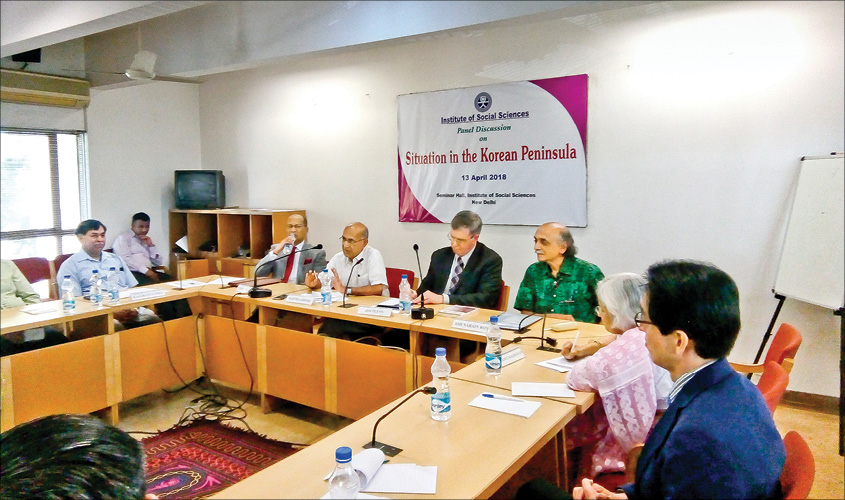‘Kim Jong Un has won the first round of this diplomacy. He knows talks with Trump will fall into his lap if inter-Korean meeting is successful’.
While there is a “good opportunity of peaceful unification of the Koreas”, the situation is still precarious as the United States remains vague and unclear on its engagement strategies with North Korean leader Kim Jong Un, Jim Flynn, president of Global Peace Foundation (GPF), observed here on Friday.
“Things have changed dramatically since January. There is an opportunity now for negotiations, but the situation is still precarious. The United States’ North Korea policy of ‘maximum pressure and engagement at the same time’ is vague and unclear. There have been negotiations, but the North Korean regime never showed intent to stop its nuclear aspirations. So, while pressure like UN sanctions have yielded efforts, it is unclear what kind of engagement strategies would lead to denuclearisation of North Korea,” Jim Flynn said.
Addressing a gathering during a panel discussion on the “Situation in the Korean Peninsula” at the Institute of Social Sciences (ISS), Flynn said that the expected meeting of the two leaders and the inter-Korean summit, scheduled in the fourth week of April, should focus on North Korea’s denuclearisation and uniting Korean people based on shared culture, language and history.
“It is believed that the final moment for the unification of Koreas has come. Efforts to unite South Korea and North Korea should focus on building a political and social atmosphere that fulfils the aspirations of the Korean people,” said Flynn.
Flynn further stressed upon the need for international cooperation to establish peace in the Korean Peninsula.
“The Koreans believe that they are torn between US and China. Going forward, there is a need for cooperation from global powers towards peaceful unification of Korean peninsula,” he added.
Flynn’s observations come in the backdrop of the much-awaited meeting between the heads of two nations—US and North Korea—that have been at loggerheads for decades.
Last month, the White House confirmed that Donald Trump has accepted an invitation from North Korean leader Kim Jong Un to meet. The development has caught international attention as a few months ago, both the leaders were exchanging threats of nuclear destruction.
While there are hopes of reunification of the Koreans, experts believe any miscalculation or misinterpretation from either side—North Korea or US—might lead to greater conflict. They believe that Kim Jong is more experienced than Donald Trump in the field of diplomacy and is already controlling the narrative.
Vishnu Prakash, India’s former Ambassador to South Korea, said: “Kim Jong Un has already won the first round of this diplomacy. He knows talks with Trump will fall into his lap if inter-Korean meeting is successful. North Korea was under pressure due to declining economy. Even China is frustrated. They did vote in favour of sanctions, but have been finding loopholes to circumvent that. So, it was time for Kim to switch gears and change tactics. That’s why they have again fallen back to their time-tested tactic of promising denuclearisation.”
Prakash further said that it is unlikely that North Korea would go further with denuclearisation because Kim Jong sees nuclear aspiration as an insurance against the toppling of the regime. “North Korea is in control of the game. It is unlikely that they will agree to absolute denuclearisation. It might give small concessions and bargain for diluted sanctions. Once that is done, China would be back in the game again in a big way,” Prakash added.
Experts further noted that unless the US pulls back its forces, the possibility of denuclearisation is highly unlikely.
North Korea, with support of China and Russia, has been demanding withdrawal of close to 28,000 US troops on South Korean soil and complete cessation of the military drills.
Dr Vyjayanti Raghavan, Professor and Chairperson, Centre for Korean Studies, Jawaharlal Nehru University, said: “Denuclearisation means different things for different people. North Korea perceives the presence of US in the Korean peninsula as a threat and believes that having a nuclear arsenal is their only way to retaliate. US wants them to give up their nuclear weapons and North Korea wants US to leave the Korean soil.”
Meanwhile, on Monday, Trump confirmed that American officials are in direct talks with the North Koreans to prepare for the meeting of the two leaders, which is expected to take place in May or early June.

